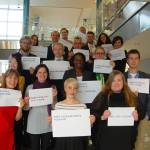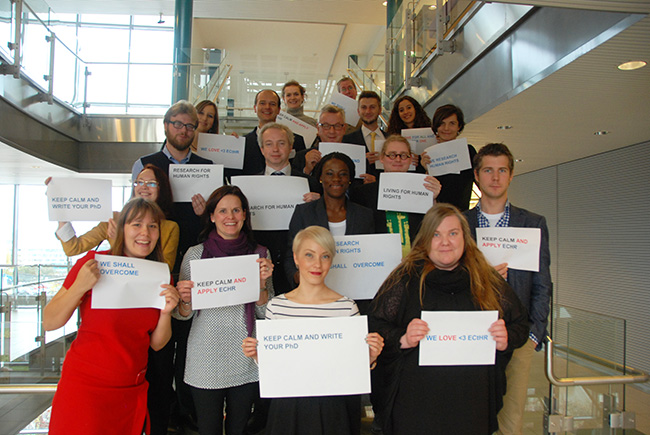
At the end of October, the School of Management and the Public Law Research Group organised an international workshop for doctoral students on the European Court of Human Rights (ECtHR).
Apart from the Finnish participants, the two-day workshop brought to Tampere eleven international doctoral students and two renowned scholars who represented eleven universities in six countries.
“We got the idea for organising this seminar two years ago at another successful seminar Taking the Doctrines the ECtHR seriously. The doctoral students I supervise also wanted to organise an event that would support their dissertation work,” says University Lecturer Jukka Viljanen, Adjunct Professor on human rights law and the person with the main responsibility for the workshop.
“We now have several doctoral students working on their theses on ECtHR so it is very important for them to create contacts with other young researchers who work on similar themes. It is also essential to have international scholars review their research already at early stages.”
Doctoral dissertations from environmental questions to paperless immigrants
The students working on the dissertations related to the ECtHR study public law at the School of Management and they include Heta Heiskanen, Kristiina Honko, Reija Knuutila, Emma Lehtinen, Jaana Palander, Elina Pekkarinen and Elina Todorov.
Their studies are all related to current human rights issues.
Heiskanen’s research deals with environmental questions, Knuutila investigates the rights of vulnerable groups, Honko studies the rules that concern war and the privatisation of military interventions. Todorov examines the legal status of paperless individuals and Palander researches the reunification of families. Lehtinen analyses the Charter of Fundamental Rights of the European Union and the European Court of Human Rights. Pekkarinen has a more theoretical approach to the contextual interpretation of ECtHR.
Tensions between the courts
The lectures given at the seminar dealt with, among other things, the current British administration’s negative stance to ECtHR. Senior Lecturer Ed Bates from the University of Leicester took look at the historical development of the situation and said that euroscepticism is the most important aspect in the current debate. Senior Lecturer Kanstantsin Dzehtsiarou from the University of Liverpool reminded the audience that a European consensus is crucial for the legitimacy of ECtHR.
The second day was opened by Matti Pellonpää, a former judge of the European Court of Human Rights, who concentrated on the tensions between the two European courts. The Court of Justice of the European Union, which is located in Luxembourg, took people by surprise last December by issuing statements that boosted its own position. Finding a solution to this dispute over the EU’s accession to the ECHR may take a long time.
Pellonpää also emphasised the correspondence between the quality of ECtHR judges and the court’s rulings. He is now a member in a panel of experts appointed by the Council of Europe to examine the new candidates for the position of a judge.
The whole range of ECtHR research was represented in the workshop
“I had decided that the topics of the workshop sessions should be ‘a living instrument’, ‘emerging consensus’ and ‘effective and practical’, which are concepts mentioned in the judgments of ECtHR.”
“We were thus able to include the full range of ECtHR research: the traditional issues of free speech and religion and the margin of appreciation doctrine but also issues that were related to economic, social and educational rights. It was also interesting to analyse the judgments of the Grand Chamber or discuss the significance of the pilot-judgments procedure or inter-state applications.”
“In my own presentation, I systemised the way in which certain legal cases are chosen. Selection of cases and presenting it in the dissertation are essential for the quality of the doctoral thesis,” says Heiskanen who is writing her dissertation on environmental cases.
Young voices were heard
Viljanen thinks that the workshop was a success.
“It is often postdoctoral researchers who hold the floor in international seminars. We were able to bring together a group of young and promising doctoral researchers so young voices were heard. Each researcher also received personal feedback, and everyone had the opportunity to present their research in a poster session.”
“Our aim is to make this network a permanent research community. My doctoral students met the international guests and made contacts they will need in their future careers. They will hopefully remember Kanstantsin Dzehtsiarou’s instruction to authors: it is very important to figure out what one wants to say with one’s research and that all claims must always be diligently grounded. Researchers should not settle for reiterating what someone else has said about the illogicality of the case-law.”
The research group will start a blog on this theme and publish the participants’ papers.


Anonymous
2.11.2015 16:40